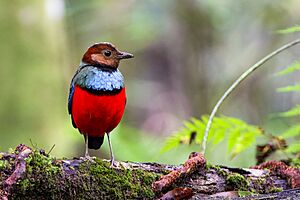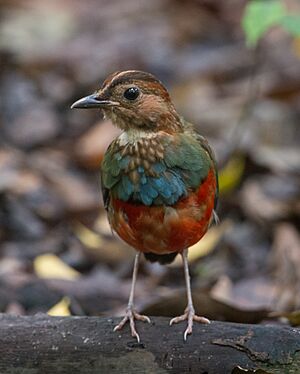Sulawesi pitta facts for kids
Quick facts for kids Sulawesi pitta |
|
|---|---|
 |
|
| Conservation status | |
| Scientific classification | |
| Genus: |
Erythropitta
|
| Species: |
celebensis
|
| Synonyms | |
|
Erythropitta erythrogaster celebensis |
|
The Sulawesi pitta (Erythropitta celebensis) is a colorful bird. It is a type of pitta, known for its bright feathers. This bird lives only in Indonesia. You can find it on the island of Sulawesi and some nearby islands like Manterawu and the Togian Islands.
These birds like to live in warm, wet places. Their natural habitat is the subtropical or tropical moist lowland forest. Sadly, their homes are shrinking because of habitat loss. This means they are losing the forests where they live.
About the Sulawesi Pitta
The Sulawesi pitta is a small, shy bird. It spends most of its time on the forest floor. They are often hard to spot because they hide in the thick plants. Their bright colors help them blend in with the forest.
Its Scientific Name and Family
Scientists gave the Sulawesi pitta its official name, Erythropitta celebensis. It was first described in 1845 by two German naturalists, Salomon Müller and Hermann Schlegel. They studied a bird found near Tondano on Sulawesi island.
At first, they put this bird in the genus Pitta. Later, it was moved to a different group called Erythropitta. This group was created in 1854 by Charles Lucien Bonaparte.
Different Types of Sulawesi Pitta
There are three main types, or subspecies, of the Sulawesi pitta. They are all slightly different and live in various parts of Indonesia:
- E. c. celebensis: This type lives on the main island of Sulawesi. It is also found on smaller islands like Manterawu and the Togian Islands.
- E. c. palliceps: This subspecies lives on Siau Island and Tahulandang. These islands are northeast of Sulawesi. This type was once thought to be its own separate species.
- E. c. caeruleitorques: You can find this type on the Sangihe Islands, also northeast of Sulawesi. Like E. c. palliceps, it was once considered a separate species.



